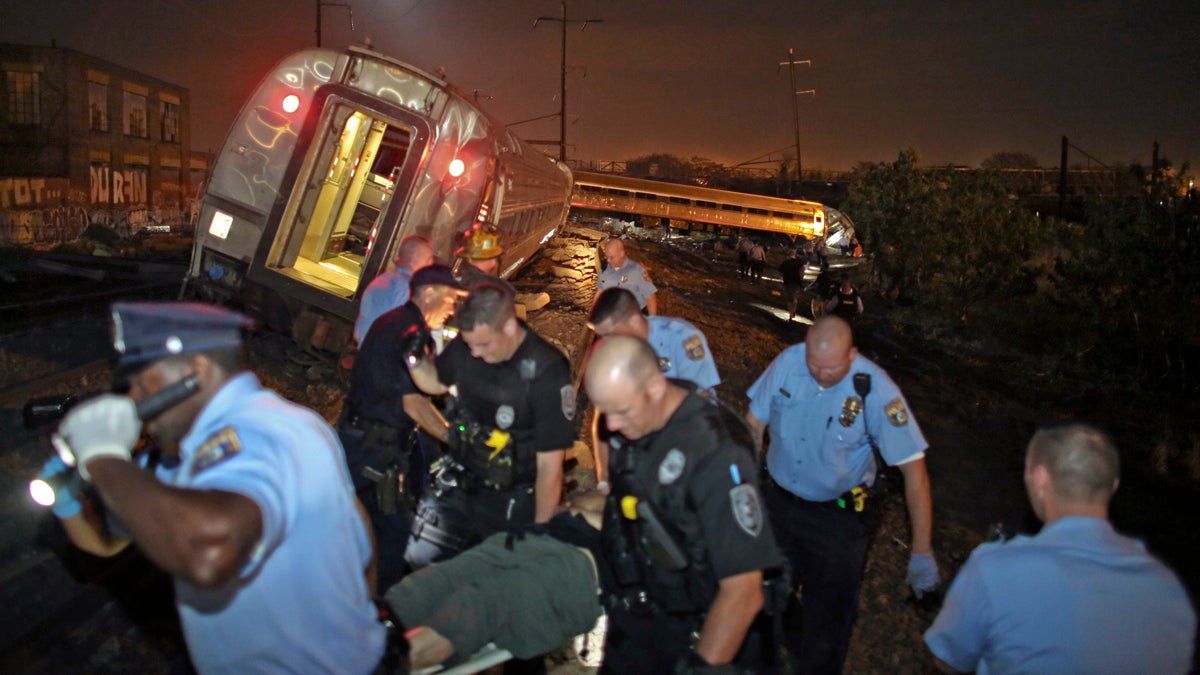Understanding what helps first responders stay sane
Listen
First responders help victims of the Philadelphia train derailment Tuesday night. (AP Photo/ Joseph Kaczmarek)
The field of studying the trauma experience by the first to arrive at the scene of horrific accident has grown by leaps and bounds since 9/11.
First responders arriving at the scene of a derailed Amtrak train in the Frankford section of Philadelphia Tuesday night encountered chaotic and terrifying scenes—passengers emerging battered and bloody, many with severe injuries. Mangled bodies were trapped under the train’s wreckage. The crash killed eight people and injured hundreds more.
Such horror often has a lasting impact on the mental health of first responders, and research on how to best help them cope has been growing exponentially since the terrorist attacks of September 11, 2001.
“Just like any human being, they have responses to overwhelming, upsetting events,” said University of Pennsylvania psychiatrist Steven Berkowitz, a nationally known expert on the impact of traumatic experiences.
“Responses include irritability, sleep problems, difficulty relating to others,” he says. “Who do you talk with about what you experienced, what you saw is often a big question, you feel isolated.”
Berkowitz directs the Penn Center for Youth and Family Trauma Response and Recovery and has worked with first responders in different city environments.
“We tend think about post traumatic stress disorder, but that happens in only ten to 15 percent of people in these situations,” he said. What’s more common is a rise in substance use after some of the major disasters. “After the Oklahoma bombing, alcoholism went through the roof, divorce rates increased, it’s the wider range of issues related to functioning and interaction that you often see.”
A lot has changed in Berkowitz’s field since the terrorist attacks of September 11th. “It was the central event that put trauma on the national agenda, and there was a real focus on the experience of first responders, a lot of work was being done and a lot of mistakes were being made.”
At the time, an approach called “debriefing” became very popular, where all first responders got together in groups to discuss what they had seen and experienced. That has since changed.
“Debriefing was done with the best of intentions, but was probably done incorrectly,” said Berkowitz. “It was done usually as a one-off intervention, and we know that just doesn’t work, in fact it can hurt, for those who are not symptomatic and are listening to those who are.”
He added that the other problem was that debriefings were often done too soon, when the experiences were still very raw, and people were not quite ready to process them.
Today’s approach is to provide first responders with information about possible symptoms, and to teach them skills to calm down and relax after a crisis situation. Social support is also crucial, said Berkowitz.
“Getting support within your agency and your colleagues, being able to be a group, whether the experiences themselves come up or not.”
Berkowitz said ongoing monitoring for symptoms was also very important in promoting mental health among first responders.
“One of the key symptoms is the sleep disturbance, if that goes on for more than three or four days, think about getting help,” he warned. “The symptom that seems to predict the worst outcomes is dissociative symptoms, spacing out, losing track of time, not knowing how you got from one place to the other, that is very concerning.”
Berkowitz said a lot of survivors of the crash will need similar supports and monitoring as the first responders.
WHYY is your source for fact-based, in-depth journalism and information. As a nonprofit organization, we rely on financial support from readers like you. Please give today.




